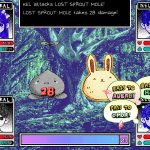Every day, Omori wakes up in a room surrounded by white light, suffocatingly small and terrifyingly vast. Depression can make all spaces feel this way. Better get moving.
Every day, Omori meets his friends, and together they walk up the rainbow staircase. Past the talking snake, past the yellow cat with giant eyes, and through the tree stump into the Vast Forest.
Every day, Omori returns to white space.
With shades of Undertale and Earthbound, Omori is an RPG that flickers from idyllic to unnerving. From parks and picnic blankets to dark rooms where shadows shudder, nosebleed fierce. Hours in, I meet a talking leaf at a train station, whose burning hatred for bunny rabbits leads it to offer me blood money for each bun I beatdown in combat. On the train, I am plunged into darkness, as rows of the identical shadows that ride beside me each warn me with some variation on “This isn’t home.”
In the opening hours, I play Hide and Seek with Omori’s friends in the park, getting to know every name and quirk. All is warm laughter, sung in the stream-of-consciousness hangout humour that the game will continue to do so well. Later, I play Hide and Seek by myself. Alone, dashing between mirrors that keep blinking out of reality, and surprising myself with fleeting, shocking proof of my own fading presence in a world I half knew wasn’t real anymore.
Omori is often about fear, but you can ignore the ‘Horror’ and ‘Psychological Horror’ tags on Steam. The game is interwoven with strings of existentialism, but those threads are part of a big, comfy, colourful sweater of an RPG, albeit one spattered with pizza-sauce stains of impending dread. Omori is about trauma, but it’s also about escape, recovery, reconciliation, and friendship. You’ll spend most of your time in the brighter moments, even if you’ll never quite shake the feeling of unease. Something often unspoken about self doubt is how it taints all your good memories. You’re in them after all, being yourself, and ruining everything. Omori casts a melancholy shadow over its brighter moments, even as it maintains hopefulness in its worst.

Consistent through all of this is an imagination and care that makes so much of Omori feel handcrafted. It’s patchwork in the way it constantly introduces new twists on its animation, UI, art style, audio, or combat. Whatever it needs to best create a scene, convey a feeling, or just surprise and delight the player with some unexpected glitch in its established rules. There are great moments of subtle comedy that rely on the player’s experience with other games, but not out of parody – these aren’t references, they’re riffs on design language that use your own familiarity to toy with you. Later, Omori will use similar tricks to traumatise you. It’s a lovely, clever detail in a game so thematically concerned with nostalgia.
There are so many unique animations that you’ll see just once and so many sound effects or musical phrases that pop up from the soil of Omori’s vast soundtrack, like a jubilant sunflower or doomsaying earthworm, then wriggle back away again, forever. Early on, you’ll gain the ability to switch party leaders, with each friend having different tools for solving environmental puzzles. You reach one such puzzle, tag a friend in, and a hand-drawn Polaroid flashes up. I found myself suitably awed when I realised that there’s a different picture for each friend tagging each other friend. The backgrounds change, too. A junkyard. A faraway planet. The insides of a giant whale.
I shouldn’t need such reminders that games are made by people. None of us should, but it’s tragically easy to forget until another report of crunch at studio X gets dropped into our laps. All games are made by people, but Omori has the kind of DIY fingerprints of a hand-labelled CD from your favourite punk band like no other recent game I can remember. One that constantly had me thinking that, heck, someone drew this. Someone sat at their synths and composed this. Someone stayed up late for years animating this. Someone dredged up a lifetime of memory, precious and awful, to write this.
All this might suggest a flipbook of disparate set pieces, but there’s a solid, crunchy RPG with some vast, puzzle-filled dungeons and chapter-spanning side quests here as well. Exploration is draped in a light metroidvania form, where every fear Omori’s friends help him overcome opens up more of the world. In combat, an elemental triangle of emotions act as both magic and status effects.
Minigames are scattered throughout the world, too. A pizza delivery dayjob that has you trying to decipher skittish pencil scrawls to find the correct addresses. A Tamagotchi/Pokemon game where you challenge other kid’s ‘Pet Rocks’. This, alongside multiple endings and secrets, can easily fill out an 18 hour story into a forty hour place to just hang. What I’m saying is: Omori is tangible. It’s a little slow, but it’s very playable. It doesn’t forget that it’s a video game.

There are content warnings at the start of the game, and they’re worth paying attention too. Omori is a game about sunny days and self isolation, about friendship and death. A game about escapism, about crystallising nostalgia as a form of psychic self defence. You’ll be taken to some pitch black places before the journey concludes, but the warmth at Omori’s core means it never feels nihilistic. The breadcrumb trail leading to the final moments is so carefully spread that I was left with little doubt that this is a story about trauma, but it’s a story dedicated to exploring trauma, rather than one that just uses trauma cynically. Put simply, Omori earns its difficult moments.
I believe it’s useful for a reader to know a critic’s biases when choosing a game. For example, I strongly believe that the most important piece of media ever created is the ‘Omelette du fromage’ episode of Dexter’s Laboratory, and you should filter all my critical insights through this dazzling fractal of subjective truth.
More pertinently to Omori, here are some more of my biases. Experiences I’ve had, and things I’ve felt, that meant I connected with Omori more than you might. I have often felt made up of muted tones in a world full of people drawn in colour. Missing inner light, as if I was lacking something fundamental. I am often bombarded with memories I’d rather forget so powerfully that they can physically stop me in my tracks. I cannot enjoy many of what should be good memories because I’m in them, being myself, and ruining everything. Omori reminded me that most people probably feel like this occasionally. Omori is a sad game that made me smile a lot.






